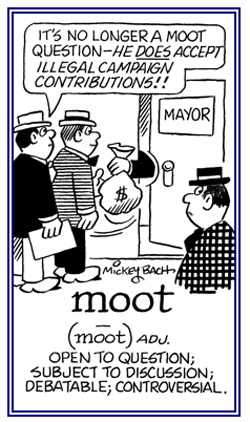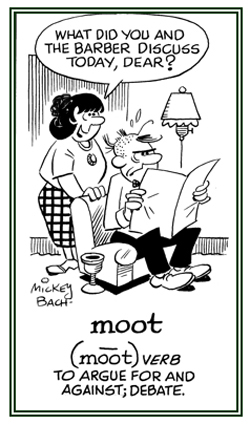You searched for:
“moot”
moot, mute, mute, mute
moot (MYOOT) (adjective)
1. Concerning something which is argued about but not possible for anyone to prove: Bernhardt said that they should have foreseen the accident, but that point was moot now.
2. Regarding something not worth talking about; no longer important or worth discussing: Francine said that that argument was a moot point and not relevant to the topic they were trying to resolve.
2. Regarding something not worth talking about; no longer important or worth discussing: Francine said that that argument was a moot point and not relevant to the topic they were trying to resolve.
mute (MYOOT) (noun)
1. An individual who is unable or unwilling to speak: The mute, who worked with the police investigator, could read lips and knew what people were saying.
2. A device attached to a musical instrument to soften or to muffle the sound: Sallie used the mute on the strings of her violin to create a new and interesting sound.
mute (MYOOT) (adjective)
1. Descriptive of something felt or expressed without the use of words: They hugged each other in mute sympathy over the death of their father
2. Relating to something which does not contribute anything to the overall sound or pronunciation of a word: The e at the end of the word mute is silent.
2. Relating to something which does not contribute anything to the overall sound or pronunciation of a word: The e at the end of the word mute is silent.
mute (MYOOT) (verb)
To make a sound softer, quieter, or less harsh: Bronson covered his ears to mute the sound of the guns being fired at the military funeral.
Abigail was asked to use the remote control to mute the excessive loudness of the TV.
Although Marla's uncle was a mute, he could play the trumpet, including using a mute to muffle the sound. In the family, it became a moot point to argue whether her uncle could communicate because he was able to do it to some degree through his music.
This entry is located in the following unit:
Confusing Words Clarified: Group M; Homonyms, Homophones, Homographs, Synonyms, Polysemes, etc. +
(page 5)
Word Entries at Get Words:
“moot”
moot (MOOT) (adjective), more moot, most moot
1. Descriptive of something that is debatable, not certain, questionable, or is totally insignificant: During a lecture, a student asked the professor a moot question regarding what was on the last test, which the other students considered to be inappropriate at that time.

© ALL rights are reserved.
Go to this Word A Day Revisited Index
When it started to rain, it became a moot decision as to where Jim and his family would have their picnic .
2. Etymology: originally in Anglo Saxon days, a moot point was one which was talked about at a "meeting" because "meeting" is the original sense of the noun moot, a town meeting for purposes of debating and discussing issues.Compiled from information provided by John Ayto
in the Dictionary of Word Origins; Arcade Publishing;
New York; 1990; page 354.
in the Dictionary of Word Origins; Arcade Publishing;
New York; 1990; page 354.

Go to this Word A Day Revisited Index
so you can see more of Mickey Bach's cartoons.
This entry is located in the following unit:
English Words in Action, Group M
(page 4)
moot (verb), moots; mooted; mooting
To present an idea or a topic for debate or discussion: The tax issues have been mooted in Congress and they will be points of arguments for a long time.

© ALL rights are reserved.
Go to this Word A Day Revisited Index

Go to this Word A Day Revisited Index
so you can see more of Mickey Bach's cartoons.
This entry is located in the following units:
Contranyms
(page 1)
English Words in Action, Group M
(page 4)
To argue for something, or against it, with another person, or people, who are opposed to the issue. (1)
This entry is located in the following unit:
Word a Day Revisited Index of Cartoons Illustrating the Meanings of Words
(page 55)
A reference to an issue that is debatable, uncertain, or questionable. (1)
This entry is located in the following unit:
Word a Day Revisited Index of Cartoons Illustrating the Meanings of Words
(page 55)
